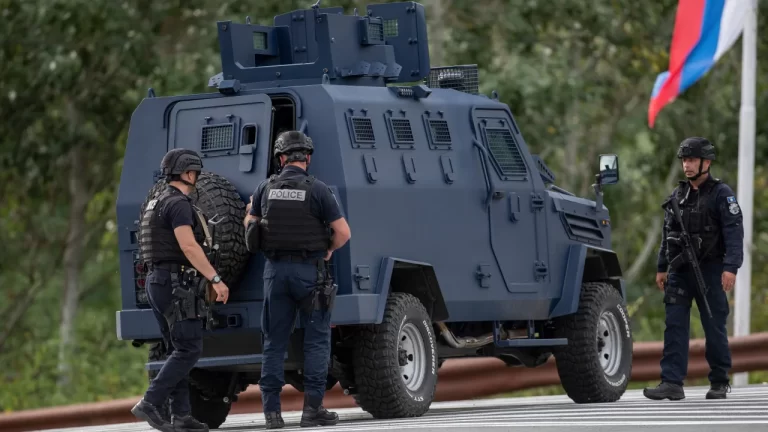Kosovo police said they killed three armed attackers and arrested another Sunday during a shootout in the village of Banjska in northern Kosovo.
The standoff between police and 30 armed men began just hours after an ambush incident left one police officer dead and another injured. Some of the shooting is taking place near a monastery in the village, police said.
“Three gunmen have been killed, two gunmen and four suspects have been arrested, the latter were found in illegal possession of radio communications, and who are suspected of being related to a terrorist group,” said Kosovo police in a Facebook post.
According to the police, the “security situation continues to be tense” although “the intensity of attacks on police officers has decreased.”
Authorities previously said they found “logistical equipment, suspected military vehicles, military uniforms as well as weapons and ammunition of different calibers” at a residential location being used by the attackers.
“Kosovo Police continues to call on criminal groups to surrender to the justice authorities and at the same time invites citizens to cooperate with the law enforcement agencies, in the interest of calming the situation and general security,” the statement read.
The incident is a serious escalation in a region already prone to unrest. Kosovo is majority Albanian, but like other villages in the north, Banjska is predominantly Serbian. Kosovo declared independence from Serbia in 2008 but Serbia sees Kosovo as a breakaway state. Kosovo’s Serbs view themselves as part of Serbia, and see Belgrade as their capital, rather than Pristina.
“We see armed, uniformed people, heavy weapons, they are shooting at us, we are shooting,” said Veton Eljsani, deputy commander of the Kosovo Police for the North region, according to CNN affiliate N1. Overnight Saturday into Sunday, a border police unit noticed two heavy trucks without license plates blocking the entrance to a bridge in Banjska, according to N1. Police units were deployed to the area.
When police officers arrived at the scene, they encountered resistance, shots were fired, and during the exchange of fire one police officer was killed and another was injured, according to N1. Kosovo police said they were shot at with “an arsenal of firearms,” including hand grenades and stun guns.
In a post on Facebook Sunday morning, Kosovo Prime Minister Albin Kurti described the shooting in the village of Banjska as a “terror attack” conducted by what he said were “Serbian criminal gangs.”
CNN has reached out to Serbia’s Foreign Ministry for comment about the incident. Serbian President Aleksandar Vučić denied his country’s involvement in the clash. He said the men killed were Serbs from Kosovo.
The Serbian Orthodox Church (SOC), which oversees the Banjska monastery, issued a statement saying calm has returned to the monastery and that police are now in control of the situation.
“The Raška-Prizren Diocese (SOC) informs the public that the situation at the Banjska monastery is presently stable,” the statement reads. “The armed individuals who breached the gate earlier today have left the premises, and there is now a presence of Kosovo police and EULEX at the entrance and within the monastery’s courtyard.”
In a statement Sunday, EU’s foreign policy chief Josep Borrell condemned the attack and called for a de-escalation of the situation.
“I condemn in the strongest possible terms the hideous attack by an armed gang against Kosovo Police officers in Banjska/Banjskë in the north of Kosovo, which left one police officer dead,” he said in a statement. “The responsible perpetrators must face justice.”
“More innocent lives are at risk in ongoing hostilities in the surroundings of Banjska Monastery. These attacks must stop immediately,” he added. The EU mission in Kosovo, EULEX, “is on the ground and in close contact with the authorities and KFOR,” the NATO-led international peacekeeping force in Kosovo, Borrell said.
“The EU and its Member States repeatedly urge all actors to work to de-escalate the situation in north of Kosovo,” he said. Tensions between Kosovo and Serbia have escalated in recent months with violent protests erupting in May over controversial local elections. Dozens of NATO peacekeepers were injured in the clashes at the time.
Kosovo’s Serbs have increasingly demanded greater autonomy from the ethnic Albanian majority.
— CutC by cnn.com


